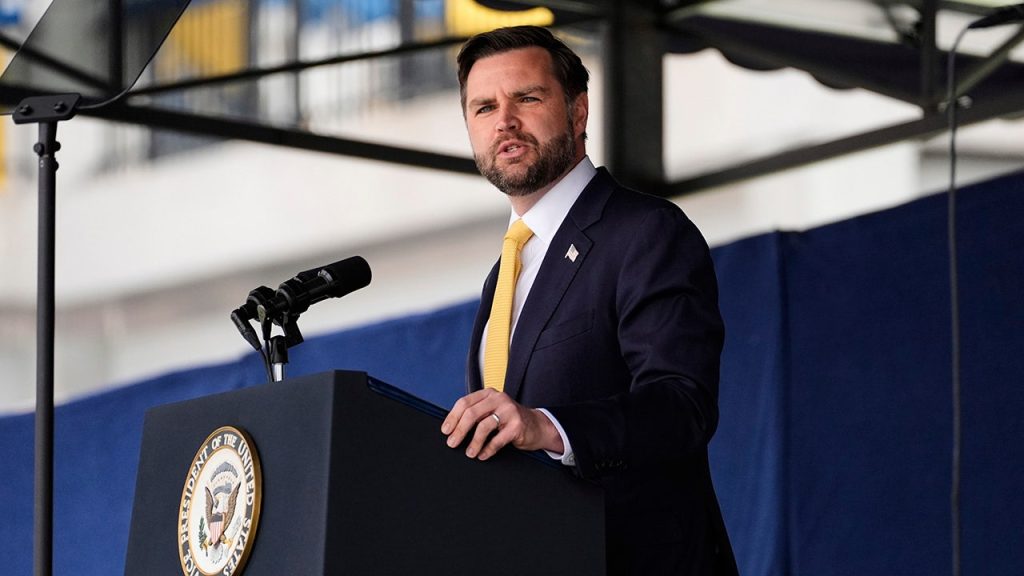On May 23, Vice President JD Vance addressed graduates at the United States Naval Academy in Annapolis, Maryland, offering a stark reflection on the current geopolitical landscape. He emphasized that they are entering a “new and very dangerous era for our country,” where nations like China and Russia pose significant challenges. Vance stressed the need for a shift in U.S. foreign policy, focusing on realism and specific, attainable goals rather than undefined missions or open-ended conflicts.
| Article Subheadings |
|---|
| 1) The New Era of Global Challenges |
| 2) A Shift in American Foreign Policy |
| 3) The Consequences of Past Policies |
| 4) Preparing for Future Engagements |
| 5) Emphasizing National Interests |
The New Era of Global Challenges
During his speech, Vice President JD Vance conveyed a sense of urgency regarding the current global political dynamics. He stated that America is now confronted with adversaries like China and Russia that are “determined to beat us in every single domain.” These assertions signify a critical awareness of the revolutionary changes in the global order following the Cold War, where U.S. dominance was largely uncontested.
The vice president indicated that this period is marked by a fundamental shift, where past assumptions about the U.S. being the world’s only superpower have been challenged. As national security becomes increasingly complex, future military leaders, like the Academy’s graduates, must navigate these treacherous waters with renewed resolve and understanding.
A Shift in American Foreign Policy
Transitioning to a new strategy in foreign affairs, Vance criticized previous approaches that relied heavily on nation-building rather than directly addressing U.S. interests. He emphasized that the Trump administration is committed to reversing course, indicating that “no more undefined missions” or “no more open-ended conflicts” will be a central tenet going forward.
This new direction reflects a commitment to realism—focusing on tangible national interests and practical strategies to counter emerging threats effectively. By stating that “when we send you to war, we do it with a very specific set of goals in mind,” he underscored the importance of having clearly defined objectives in military engagements.
The Consequences of Past Policies
Vance elaborated on the failures of historical foreign policy choices, asserting that previous U.S. administrations engaged in a “long experiment” trading national defense for international interventions that often lacked connection to core American interests. He lamented that this approach led to diminished focus on real threats as the U.S. pursued less critical objectives, such as democratizing other nations.
Such miscalculations have resulted in significant costs, not just financially but also regarding national credibility and military readiness. In his remarks, Vance recalled the brief period after the Soviet Union’s collapse when the U.S. felt secure in its superpower status and worried less about emerging challenges from rivals.
Preparing for Future Engagements
Drawing on experience and historical lessons, Vance articulated a call for a more deliberate approach to military readiness. He insisted that future leaders will have a crucial role in shaping how America engages with its adversaries. To adequately prepare for upcoming threats, he emphasized the importance of modernizing military tools and strategies.
“We can no longer assume our engagements will come without cost,” he advised, promoting a strategic realignment that prioritizes investment in innovation across military sectors. This includes rewarding risk-takers within the Department of Defense and streamlining acquisition processes to adapt to the complexities of 21st-century warfare.
Emphasizing National Interests
Throughout his address, Vice President Vance reiterated the importance of ensuring that U.S. actions abroad are closely aligned with national interests. He stated that the administration aims to invest in capabilities that strengthen military outcomes without detaching from the realities of global competition.
By fostering this alignment, Vance believes that the U.S. can effectively reclaim its position in international affairs while safeguarding its core strategic interests. This vision for a more robust and disciplined military approach is a reflection of the evolving challenges that U.S. forces will undoubtedly face in the coming years.
| No. | Key Points |
|---|---|
| 1 | Vice President JD Vance addressed graduates at the United States Naval Academy, emphasizing the responsibilities facing military leaders. |
| 2 | The vice president outlined a necessary shift in U.S. foreign policy towards realism, focusing on core national interests. |
| 3 | He criticized past U.S. foreign policy, which he argued was overly focused on nation-building rather than addressing real threats. |
| 4 | Vance called for a modernization of military strategies to prepare for potential conflict. |
| 5 | Investment in military innovation and effective risk management was emphasized as essential for future operations. |
Summary
Vice President JD Vance‘s address at the United States Naval Academy marks a pivotal moment in articulating a renewed foreign policy framework within a rapidly changing global context. By focusing on specific national interests and calling for improved military preparedness, this speech reflects the administration’s commitment to addressing emerging challenges effectively. The graduates of the Naval Academy are thus urged not only to lead but to adapt to a landscape fraught with complexities that require both strategic foresight and operational readiness.
Frequently Asked Questions
Question: What did Vice President Vance emphasize regarding future military engagements?
Vice President JD Vance emphasized the importance of having clearly defined objectives and specific goals when engaging in military actions, indicating that the U.S. can no longer assume that engagements will come without cost.
Question: How does Vance view past U.S. foreign policy?
He criticized previous administrations for focusing on nation-building rather than addressing immediate threats to national defense and interests, arguing that this led to significant costs and weaknesses.
Question: What strategic changes did Vance advocate for in military policy?
Vance advocated for increased investment in military innovation, streamlining weapon acquisition processes, and prioritizing risk management to address future challenges and enhance the effectiveness of U.S. forces.
